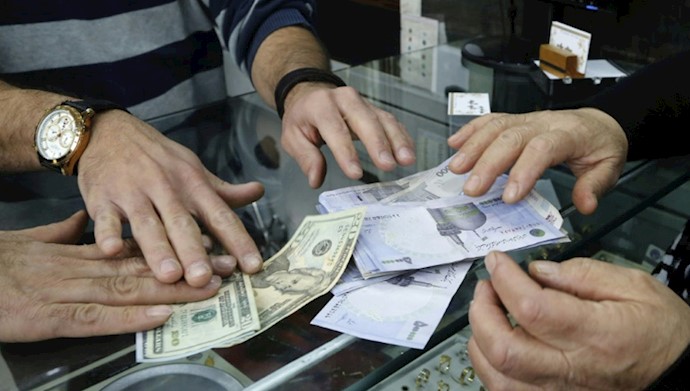Analysis by PMOI/MEK
Iran, July 26, 2019 – In Iran, the U.S. dollar is traded at two completely different rates: The state-set rate and the true rate set by the market. The state-set rate is at about 42,000 Iranian rials while the fluctuating real price of U.S. dollars set by the market is three times that amount, somewhere between 120,000 to 140,000 rials.
Traditionally, the purpose of this setup is to provide cheap foreign currency to importers of essential goods and services such as food and medicine, or raw materials that help Iranian factories produce at competitive prices. The dollars that are sold to the “private sector” at the low rate are covered with the foreign currency Iran receives through its crude oil sales. In a way, this should act as a type of government subsidy for essential goods and services, helping the Iranian economy to thrive.
However, to no one’s surprise that is not what actually takes place.
There are many institutions and individuals among the well-connected elite in Iran who are the actual recipients of the U.S. dollars at the state-set rate and instead of spending the money for its original purposes, the recipients import luxury items for their fellow oligarchs or simply deposit it in foreign accounts.
In the eternal fights among the different factions of the ruling elite in Iran, both sides are trying to blame their opponents for the corruption to avoid the increasing public outrage over poor economic conditions and blatant corruption.
In his recent visit to Northern Khorasan province, Iranian regime president Hassan Rouhani blamed profiteers for taking U.S. dollars at state-set rates and not importing essential goods.
“These profiteers took the dollars from us to import essential goods to cover the public’s needs, but cheated and used fake forms, and didn’t live up to their obligations, leaving the people to suffer,” Rouhani said.
Nonetheless, the fact is that the very profiteers Rouhani talks about are the governmental institutions or individuals with excellent connections to the top. Otherwise, they would not have received any foreign currency for importing goods.
“While providing foreign currency at state-set prices to government companies, we have repeatedly warned and the government has never listened,” says Gholam Ali Jafarzadeh, a member of the regime’s Majlis (parliament). “Ten thousand government companies have received subsidized foreign currency. If the government has been cheated while distributing subsidized foreign currency, it needs to go after the perpetrators. The government needs to identify the CEOs who did wrong and refer them to the judiciary.”
While profiteers received subsidized foreign currency, in many cases they sell their imported goods at real market rates.
According to Keyhan newspaper, the head of Iran’s Chicken Farming Association says: “During the Persian new year (March 21), the price of soy imported with subsidized foreign currency that should have been 24,000 rials per kilo reached 50,000 rials per kilo. Now that the set price for it is 24,500 rials, the end-user is getting it for 31,500 rials.”
“Just in the second half of the Persian year 2018-2019, more than $3.7 billion have been allocated for livestock food at 42,000 rials. However, the end product reaches chicken farmers at twice the price. The institution's responsible need to answer where the remaining hundreds of billions of rials of subsidies from the public’s pockets went?” asked the president of Iran’s Chicken Farmers Association.
Majlis member Vali Maleki describes another avenue of stealing foreign currencies at state-set prices and addresses Rouhani directly. “Immense economic pressure has devastated the people. In these circumstances, it is very painful to hear that foreign currencies are sold to charities, individuals, and companies that have infiltrated ministries and the Central Bank by forging documents and are importing secondhand equipment. Dear colleagues, please note that foreign currency at the rate of 42,00o rials was supposed to be used for essential goods. However, we have reports and documents that show this currency has not been used properly,” he said.
Gholamhossin Esmaily, spokesman for the judiciary says, “$157 million at state-set rates have been paid for importing paper. However, only about $57 million worth of it has been imported into the country.”





